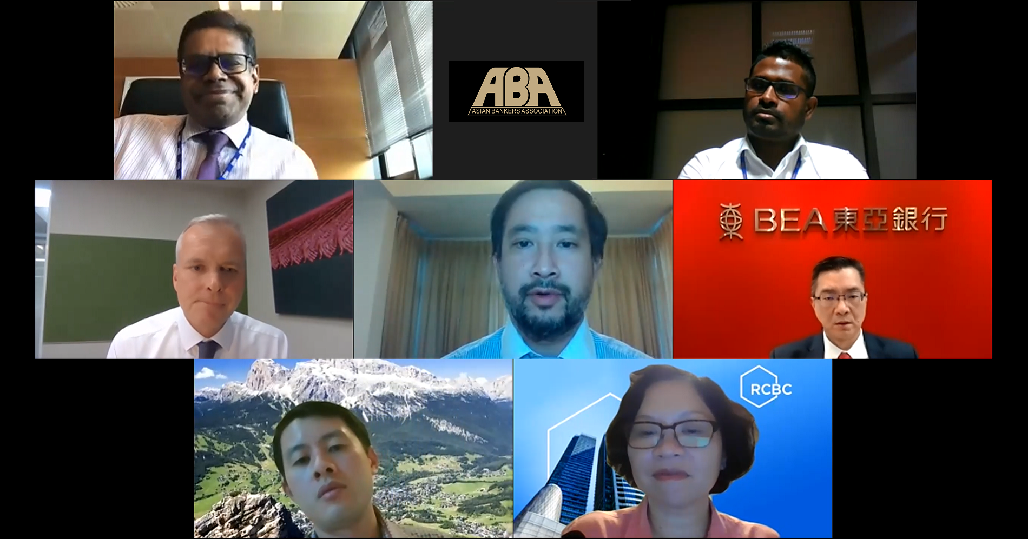 On November 13th, the ABA Policy Advocacy Committee held its second meeting for 2020 in an online format – the first-ever online meeting of the Committee – as it was not possible to hold a face-to-face discussion due to the ongoing COVID-19 pandemic.
On November 13th, the ABA Policy Advocacy Committee held its second meeting for 2020 in an online format – the first-ever online meeting of the Committee – as it was not possible to hold a face-to-face discussion due to the ongoing COVID-19 pandemic.
The main agenda of the meeting was to consider position papers on policy issues that were earlier decided by the Committee at its first meeting for the year on February 28, 2020 in Negombo, Sri Lanka to be the focus of the policy work of ABA for the year 2020.
The position papers were presented by representatives of ABA member banks and ABA Knowledge partners who were earlier invited and agreed to prepare the papers. Members of the ABA Board of Directors were invited to participate in the online meeting. ABA Chairman’s Opening Remarks
Mr. Jonathan Alles, Chairman of ABA and Managing Director/CEO of Hatton National Bank welcomed the meeting participants and thanked them for attending the virtual session.
Mr. Alles explained that holding the meeting in an online format had been necessitated by the ongoing COVID-19 situation, which had disrupted the planned gatherings, programs and events of many associations including the ABA. Given the health issues surrounding the pandemic, it was decided that holding the meeting online was the safest way of bringing members together.
Mr. Alles conveyed his special thanks to those who agreed to present papers for sharing their knowledge and expertise on policy issues of current concern to the banking community.
Mr. Alles proposed that the Policy Advocacy Committee meet more frequently, preferably twice a year, to provide members more opportunity to address relevant and timely policy issues. He suggested the possibility of holding the next one sometime in early 2021, with the objective of identifying and agreeing on policy issues that the Committee will tackle during the year, and asking for volunteers from among member banks and Knowledge partners to prepare the policy papers on these issues for discussion at the next ABA Conference to be held in the latter part of 2021 in Negombo, Sri Lanka.
In closing, the ABA Chairman encouraged everyone to extensively participate in the discussions at the day’s virtual meeting so that concrete steps can be taken by the ABA on policy issues of current concern to ABA members, thereby affirming ABA’s position as the voice of the region’s banking sector.
Committee Chairman’s Introductory Remarks
Mr. Dilshan Rodrigo, Chairman of the ABA Policy Advocacy Committee and Chief Operating Officer of Hatton National Bank, joined Mr. Alles in welcoming the participants and in thanking the paper presenters for their valuable contribution to the policy advocacy work of the Association. He then gave a brief outline of the meeting agenda, before proceeding to request each of the paper presenters to make their presentations.
1. Policy Paper on Promoting Cooperation in Crisis and Disaster Preparedness and Recovery
Ms. Christina Alvarez, Senior Vice President and Head of Corporate Planning Group at Rizal Commercial Banking Corporation (RCBC), discussed the RCBC paper sharing the Bank’s experience in the area of crisis management and in the implementation of its Disaster Preparedness and recovery Plan during the Covid-19 pandemic.
In her presentation, Ms. Alvarez highlighted the following points:
RCBC has a comprehensive Crisis Management Framework in place that is meant to prepare the Bank for an event-led disruption in operations, synchronizing all efforts in the Bank to limit losses and recover operations as fast as possible.
In response to the Covid-19 pandemic, the Bank’s plans and strategies were recalibrated and priorities were reset to respond to the current situation. To survive the crisis, the bank set up “Defense Strategies”: (i) Protect the lives of bankers who have become front liners; (ii) Defend the bank aggressively against largest risk for banks which is loan default and bad loans; and (iii) Preserve cash flow by drastically cutting expenses and Re-engineering operations.
Looking beyond the limitations, towards a view of recovery, an “Attack Strategy” was also put in place which included: (i) Re-skilling the organization and re-deploying hundreds of employees to collections and refinancing where a surge in demand was expected; (ii) Going digital, with the bank accelerating its digital plans; and (iii) Continuing to incorporate a long-term view by responding to the needs of the unbanked and underserved population, in support of the Central Bank’s advocacy for financial inclusion.
2. Policy Paper Entitled “From Risk to Resilience: The Need for Asian Banks to Comprehensively Address Physical Climate Risks”
Dr. Adrian Fenton, Vice President, Asia Sustainable Finance at the World Wide Fund for Nature (WWF) Singapore, summarized his paper outlining the vital role financial institutions have in supporting adaptation efforts to address climate change as well as the dangers which physical risk brought about by climate change pose to the financial sector. The paper sought to start the process of addressing this by: (a) outlining what the physical risks are and why these should be a concern; (b) how physical risks can affect financial institutions, and (c) how physical risks can be addressed.
Dr. Fenton’s paper highlighted the following points:
- Physical risks refer to the likelihood of nature-related hazards occurring and their impacts when they occur. Understanding physical risks requires knowledge on 1) natural hazards and their potential occurrence, 2) exposure of business activity and assets to physical hazards, 3) sensitivity of business activities or assets and the wider context to nature-related hazards, and 4) the adaptive capacity of stakeholders to physical risks.
- Physical risks have characteristics which make them especially difficult to manage: (i) Changes in their magnitude and frequency of physical risks will be non-linear and difficult to predict over the long-term; (ii) Surpassing ecosystem ‘tipping points’ will lead to rapid ecosystem change, yet understanding when these will be surpassed is difficult to know; (iii) As climate change increases historical climate and weather data will be less useful for predicting the future; (iv) Physical risks are covariate with both localised and systemic impacts.
- Much more attention will need to be given by banks to physical risk stress testing which can be applied at transaction, portfolio, organisation or market level. Physical risk scenario stress testing can be used: 1) internally with the objective to assess existing portfolios and operations to credit, market, liquidity, and operational risks; 2) to assess implications of physical risks on sectors and markets to help form lending policies; and 3) to assess potential and current clients.
- Businesses that are better able to manage physical risk will likely gain competitive advantages of their peers and will be less risky clients for banks. Many activities can be classified as adaptation – though not all would be classified as such by banks.
- Efforts to understand physical risks must also focus on understanding sensitivity and resilience as well as only exposure. The recent UNEP-FI TCFD Banking Pilot Project Phase II Report highlighted eight potential indicators for assessing business sensitivity to physical risks: (i) reliance on natural resources, (ii) reliance on secure energy supplies, (iii) reliance on climate sensitive supplies, (iv) reliance on secure transport routes, (v) reliance on efficient operation of assets and processes, (vi) climate sensitivity of market demand, (vii) potential for environmental and social impact, and (viii) reliance on labour health and productivity.

3. Policy Paper on Promoting Cooperation Efforts in Collaborating with Fintech Companies
Mr. Lionel Ho Tze-Kuang, Head, Digital Strategy, GS-Group, Digital at Maybank, presented a paper sharing Maybank’s efforts and initiatives in collaborating with Fintech companies, the Bank’s experience in addressing and overcoming challenges in doing so, and information on government policies and regulations aimed at promoting collaboration between banks and fintech companies.
In his paper, Mr. Ho Tze-Kuang pointed out that:
- The growing demands of customers for rapid innovation has necessitated partnerships & alliances between banks and fintech companies.
- While incumbent banks face innovation challenges specific to their traditional business models and legacy systems, fintech companies face their own set of difficulties – such as winning the trust of customers, meeting regulatory requirements, and unlocking scalability.
- To compensate for these shortcomings, banks & fintech companies are increasingly entering strategic alliances and partnerships. However, disciplined execution is crucial to ensure that partnerships are productive and achieve target outcomes.
- The key to mutually beneficial, fruitful partnerships is in the ability to identify opportunities to unlock value, the willingness to adapt & collaborate, and the discipline to maintain strict compliance & regulatory standards.
4. Policy Paper Exploring the LIBOR Transition After 2021 and Its Implications for Member Banks
Mr. Oliver Hoffmann, Managing Director, Head of Asia, Erste Group Bank AG, presented a summary of his paper providing an update on the LIBOR situation and its impact on banks’ lending operations. Among others, the paper considered alternative benchmarks following the non-availability of LIBOR in 2021 and how banks can prepare for it; identified fundamental problems related to LIBOR (e.g., conflict of interests, low liquidity, and small volume of trade) and the current challenges and the potential solutions; and (d) formulated recommendations on how banks can face the transition away from LIBOR.
Mr. Hoffmann gave a situation update on Asian banks, highlighting the following:
- Transition plans for most banks are on track, with Covid-19 not expected to delay the LIBOR phaseout.
- Banks across regions have increased their exposure to new ARRs
- Banks absolute exposures to LIBOR-linked contracts are largely unchanged.
- Key challenges for Asian banks include ARR liquidity, fallback implementation, systems and models update, and valuation impact.
5. Policy Paper on Promoting Cooperation on Cyber Security Management
Mr. Eric Wong, Group Information Officer, General Manager, Head of Technology and Productivity Division at The Bank of East Asia Ltd., summarized his paper discussing a structured cyber security cooperation model based on the People, Process, and Technology Framework for strengthening the cyber security controls to prevent cyber-attacks and to minimize the impact of successful attacks.
Mr. Wong stressed that a strong culture of cyber security cooperation raises a synergy effect in defending against cyber attacks and combating cyber crimes, and that an effective cyber security information sharing mechanism is indispensable.
Mr. Wong’s presentation pointed out that:
- Proactive information sharing on cyber-attacks and cyber-defense is one of the critical success factors in building effective cyber resilience and evolving immunity across industries and regions.
- Innovation and digital transformation play a major role in modern banking. To cope with the risks of these banking innovations, banks’ control functions should work hand-in-hand with the business in understanding the underlying technology solutions and evaluating relevant security risks and controls. The regulators also have a role to play; they should display prompt supervisory efforts to guide the industry in managing the relevant emerging risks induced by innovations.
- To sustain both sharing and information, “People” is the most important element in bringing a successful cyber security cooperation. In the face of such challenge, a multiparty-drive and industry-wide programme should be implemented to uplift the competency standards and enable effective training for enhancing the capabilities of cyber security practitioners.
- While cyber-attaches would never be stopped as long as the cyberspace exists, it is necessary to continuously advance and deepen the cyber security cooperation and putting this as one of the highest priority items in the cyber security strategy.
6. Policy Paper on Cyber Security Preparedness
Mr. Suresh Emmanuel, Chief Information Security Officer at Hatton National Bank, presented a summary of his paper sharing a systematical approach for a bank to improve and strengthen its cyber preparedness and resilience.
According to HNB, cybersecurity should be an important and amplifying component of a bank’s overall risk management. Hence, a bank should build a strategy which is based on the following preparedness principles, namely: (a) identify, (b) protect, (c) detect, (d) respond, and (e) recover.
Mr. Emmanuel pointed out the following:
- The above-mentioned principles would provide a bank to assess its positioning in identifying their current maturity level.
- A bank should start its current state assessment and based on results shall build up a strategy towards a journey to achieve different levels of maturity over a period of time.
- The said five principles would cover actions to be taken holistically at ground level for a Bank in implementing effective security parameters.
- Periodic review and continual improvement should be done in a systematic approach through steering committees and top management to ensure safeguards are in place and effectively functioning.
- Enterprise level risk management function should include Cyber security and regular discussion item and it’s also should be a regular discussion point in Board agenda.
- Top to bottom, bottom to top and across the organization with effective communication and awareness training are important aspects for a bank to position itself in a comfortable place.
Consideration of Issues for Future Policy Advocacy Work
Mr. Rodrigo reiterated the suggestion of ABA Chairman Mr. Alles in his Opening Remarks to convene a meeting of the ABA Policy Advocacy Committee at least once every six months, and to consider during such meeting position papers – if possible six of them – on policy issues that are relevant, timely and of current interest to members.
The Committee thereafter considered and exchanged views on possible issues for policy advocacy work of ABA over the next six months. Among the issues raised during the discussions were the following:
- Dr. Adrian Fenton suggested the need for cooperation in promoting decarbonized portfolio among member banks in line with national efforts to address the issue of climate change. He agreed to have his organization (WWF Singapore) prepare a position paper on this topic for presentation at the next Committee meeting.
- Mr. Oliver Hoffmann pointed out that the topics of the six position papers presented during the meeting are all very relevant and are likely to remain to be so in the near future. Hence, he suggested that for the next meetings, regular updates on these issues would be beneficial to members and should be considered for future policy work of the Committee. Mr. Hoffmann agreed to prepare another on the LIBOR scenario, touching mainly on banks can adapt to the new environment.
- Ms. Christina Alvarez noted that the regulators in the Philippines (and probably in other countries as well) have implemented sustainability framework for banks to follow. However, some banks may find it challenging to implement the said sustainability framework, She therefore suggested that ABA may consider activities to help member banks in their efforts to meet the challenges they experience in achieving the sustainability goals set by the regulators.
- Mr. Rodrigo suggested to Mr. Lionel Ho Tze-Kuang on the possibility for Maybank to prepare a policy paper on how member banks can collaborate with each other in their common journey towards a digitalized environment.
- Mr. Rodrigo also said that Hatton National Bank will prepare a policy paper sharing its experience in its efforts to help strengthen supply chain linkages of their customers, particularly the MSMEs and the SMEs, and to support their digitalization transformation. 26. Given the above suggestions, Mr. Rodrigo said that the Secretariat will be coordinating with member banks and Knowledge Partners concerned on the policy papers (and on relevant preparations) for the next Committee Meeting, mostly likely in March or April of 2021, and for the 37th ABA General Meeting and Conference tentatively scheduled in late 2021 in Negombo, Sri Lanka (should travel restrictions be eased or lifted by that time).
Adjournment
Before adjourning the meeting, Mr. Rodrigo said that copies of all the six papers discussed during the meeting would be disseminated to ABA members for review and comments.
He then proceeded to once again thank the participants for their strong support of the ABA, and encouraged them to continue communicating with each other on policy areas which they deem should be included in the future policy advocacy work of the ABA.


Leave a Reply